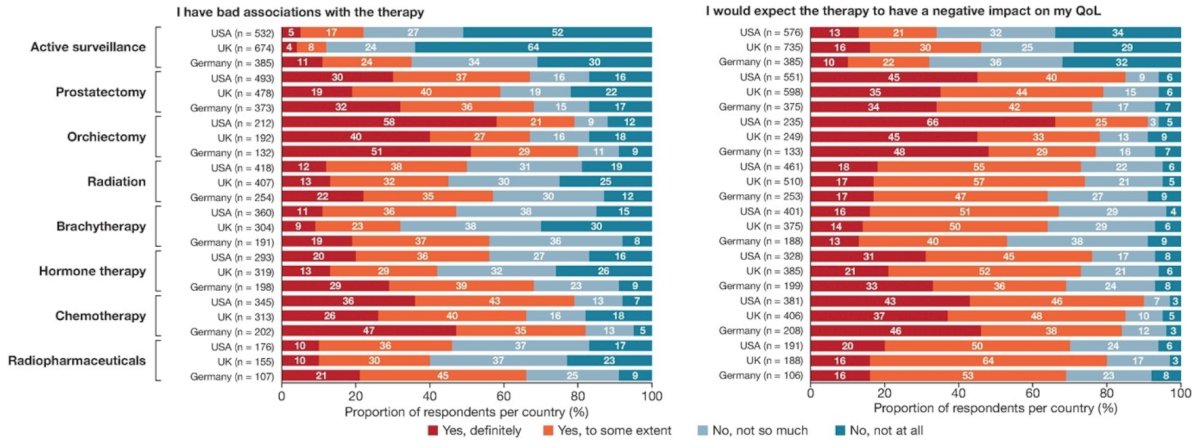(UroToday.com) The 2022 European Society of Medical Oncology (ESMO) annual meeting featured a prostate cancer session, including a presentation by Dr. Joe O'Sullivan discussing the quality of life across three countries using a large-scale, fully digital survey of patients with prostate cancer.
Incidences of prostate cancer vary widely across regions and have fluctuated in recent years in line with PSA screening practices. In 2020, the age-standardized incidence for men in higher human development index (HDI) countries was 37.5 per 100,000 compared with 11.3 per 100,000 in lower HDI countries. Mortality values were 8.1 and 5.9 per 100,000 in higher and lower HDI countries, respectively. Mortality from prostate cancer has declined in higher HDI countries since the mid-1990s and patients with prostate cancer are living longer, owing to advances in diagnosis and therapy. Patient experiences with regard to care received and quality of life is an essential factor to consider both for decision-making and patient satisfaction. As such, quality of life outcomes may differ among patients with prostate cancer depending on disease setting, treatment received, and country/healthcare system. This study aimed to understand the differences in quality of life expectations and experiences in patients with prostate cancer and varying disease burdens across three countries.
In a large-scale, self-report digital survey, patients with non-metastatic (M–) and metastatic (M+) prostate cancer in Germany, the UK and the US reported demographic and clinical factors, disease and treatment history, and quality of life using validated measures (e.g., Functional Assessment of Cancer Therapy – Prostate [FACT-P]). Patients also rated their degree of positive vs. negative views of each type of prostate cancer therapy not (yet) received and expected impact on quality of life. Predictors of quality of life were examined using analysis of variance, t-tests, and chi-square tests. Multivariate regression analysis examined the relative impact of one predictor while controlling for others. Dr. O’Sullivan and colleagues assessed for between-group differences > 10, the previously defined cutoff for clinically meaningful FACT-P differences.
Among 15,511 patients, 20% had M+ prostate cancer, 37% had symptoms at diagnosis, 23% had diabetes, 27% had cardiovascular disease, and 9% had kidney disease. Demographic factors were similar across countries. Patients had mostly negative views of therapy not yet received and expected negative impact on quality of life:

Overall, across all three countries, chemotherapy and orchiectomy were viewed most negatively, followed by prostatectomy, then hormone therapy, radiation, radiopharmaceuticals and brachytherapy:

On univariate analysis, FACT-P scores were significantly better among patients with M– vs. M+ disease, patients with no comorbidities vs. ≥ 2 comorbidities, and patients without vs. with severe comorbidity. Age and prostate cancer symptoms at diagnosis were not meaningfully associated with FACT-P scores. On multivariate analysis, M– vs. M+ disease and no comorbidities vs. ≥ 2 comorbidities showed meaningful differences in quality of life:
Dr. O’Sullivan concluded this presentation discussing quality of life across three countries using a large-scale, fully digital survey of patients with prostate cancer with the following take-home messages:
- Self-reported quality of life in patients with prostate cancer did not vary substantially by country though treatment strategies differ
- Quality of life was significantly affected by M+ status and comorbidity burden
- Quality of life interventions should target these at-risk groups to reduce symptom burden, tolerance of treatment and fear of therapy
Presented by: Joe O'Sullivan, MD FRCPI, FFRRSCI, FRCR, School of Medicine, Dentistry And Biomedical Sciences, Queen's University Belfast, Belfast, UK
Co-Authors: B.D. Gonzalez2, L.M. Gudenkauf3, R. Lehmann4, S. Allen5, C. Ernst-Guenther6, H. Wolinsky7, A. Poschenrieder8, O. Mirante9, A.K. Morgans10
Written by: Zachary Klaassen, MD, MSc – Urologic Oncologist, Assistant Professor of Urology, Georgia Cancer Center, Augusta University/Medical College of Georgia, @zklaassen_md on Twitter during 2022 European Society of Medical Oncology (ESMO) Annual Hybrid Meeting, Paris, FR, Fri, Sept 9 – Tues, Sept 13, 2022.



